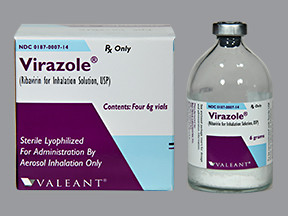RIBAVIRIN - INHALATION
PHONETIC PRONUNCIATION: (RYE-ba-VYE-rin)
COMMON BRAND NAME(S): Virazole
GENERIC NAME(S): ribavirin
Uses
USES: This medication is an anti-viral drug used to treat infants and young children who have a severe lung infection caused by a certain virus (respiratory syncytial virus-RSV). Nearly all children become infected with this virus before they are 3 years old. Most cases are mild and do not require anti-viral drugs. This medication is used to treat severe RSV infections that need treatment in a hospital. Ribavirin for inhalation is not recommended for use in adults.
How to use RIBAVIRIN - INHALATION
HOW TO USE: Read and learn all preparation and usage instructions supplied by the manufacturer. Follow all instructions for proper mixing. Before using, check the product visually for particles or discoloration. If either is present, do not use the liquid. This medication is given by continuous inhalation, usually for 12 to18 hours daily for 3 to 7 days or as directed by the doctor. A special machine (small-particle aerosol generator) is used to make a mist, which is then inhaled through the mouth or nose. Health care workers providing care to patients receiving this medication should learn all precautions for handling/giving this medication (e.g., wearing a mask, room ventilation). The manufacturer recommends that health care workers who are pregnant should consider avoiding direct care of patients using this medication. This medication must not be used during pregnancy since it may harm an unborn baby. Consult the manufacturer's package or the hospital/occupational safety guidelines for details.
Side Effects
Precautions
Interactions
Overdose
Images
Reviews
Faq for RIBAVIRIN - INHALATION
Ribavirin inhalation is used to treat severe respiratory syncytial virus (RSV) infection in infants and young children.
Ribavirin works by inhibiting the replication of the RSV virus, which helps to decrease the severity and duration of the infection.
Ribavirin inhalation is administered using a specialized delivery system known as a small-particle aerosol generator (SPAG-2). The medication is mixed with sterile water and then converted into a fine mist that is inhaled by the patient.
Common side effects of ribavirin inhalation include cough, wheezing, sneezing, nasal congestion, and mild breathing difficulties. These side effects typically resolve on their own.
Yes, ribavirin inhalation can cause serious side effects such as anemia, difficulty in breathing, chest pain, and eye irritations. It is important to seek immediate medical attention if any of these symptoms occur.
Ribavirin inhalation should not be used by pregnant women as it may cause harm to the fetus. Adequate contraception should be used by both males and females during treatment with ribavirin.
The duration of treatment with ribavirin inhalation varies depending on the severity of the RSV infection. It can range from a few days to a few weeks, as determined by the healthcare provider.
Ribavirin inhalation may interact with certain medications, particularly those that affect the blood (e.g., azathioprine, zidovudine) or the central nervous system (e.g., tranquilizers, sedatives). It is important to inform your doctor about all the medications you are taking before starting ribavirin inhalation.
Ribavirin inhalation is primarily used in infants and young children for RSV infection. It is not commonly used in adults, and alternative treatments may be recommended.
Warning
WARNING: Caution is advised when using this medication in people who are using a certain breathing device (ventilator). Read and follow the manufacturer's directions for use and care of the ventilator. Follow all directions from the manufacturer to prevent particle buildup in the device. Doing so will help the device work properly and may prevent serious side effects (e.g., air pressure buildup inside the lungs). Infrequently, sudden worsening of breathing problems may occur, especially when this medication is first started. If this occurs, treatment should be stopped. If you and the doctor decide to restart ribavirin treatment, the doctor will monitor closely to decrease the risk of side effects.
Disclaimer
IMPORTANT: HOW TO USE THIS INFORMATION: This is a summary and does NOT have all possible information about this product. This information does not assure that this product is safe, effective, or appropriate for you. This information is not individual medical advice and does not substitute for the advice of your health care professional. Always ask your health care professional for complete information about this product and your specific health needs.


No Reviews Yet